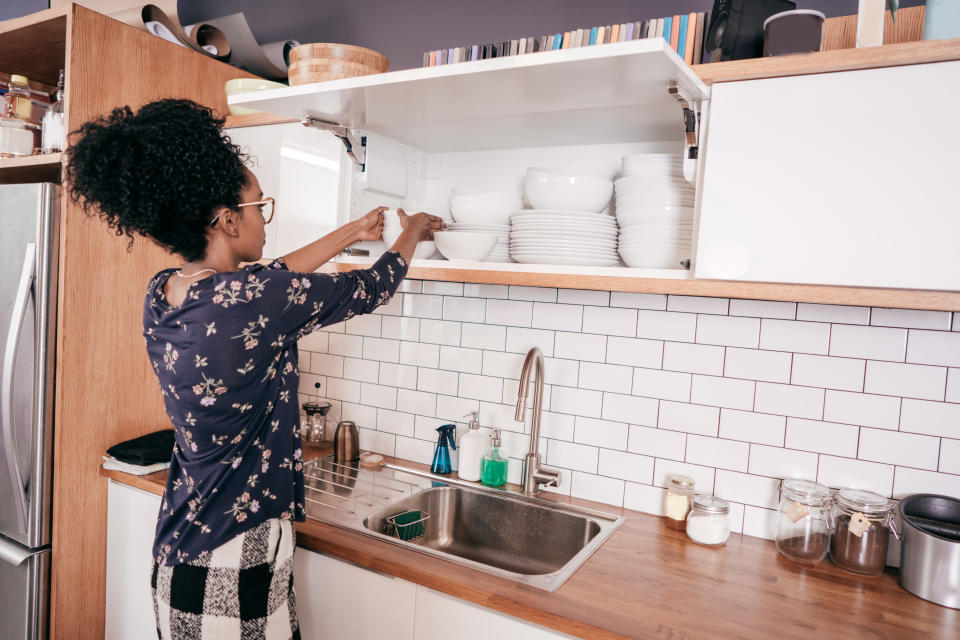5 ways to simplify your stuff and save money
If the new year – or Marie Kondo’s Netflix show “Tidying Up” – inspired you to tackle a cleaning and organizing project in your home, the process may seem daunting, but it’s an opportunity to get your space–and your mind– under control, says Tova Weinstock, or “Tidy Tova,” a professional organizer based in New York.
“It's really easy for people to function in mess but I do think that a common thing is clutter of the space, clutter of the mind,” she says. “If you have a messy space, you tend to be a little more frazzled in the world.”
The key to getting organized is to rethink what you’re bringing into your life and be more mindful of your possessions and their value to you, Weinstock says.
“I really believe in ‘real life tidy’ which is an attainable tininess and it's really about simplifying,” she says. “You should be a little more in touch with what you're bringing into your life.”
In the process of getting organized, Weinstock says you don’t need to spend a lot of money or waste it on products and organizing systems. Instead, simply taking stock of what you have can help you reassess your shopping and buying habits. Weinstock shares her 5 steps to reaching “real-life tidiness.”
Step 1: Start small
If your goal is to “get organized” it’s important to break it down into smaller goals so they’re much more attainable, Weinstock says.
“Maybe that goal is just making your bed every morning and then you realize, ‘this feels kind of nice, I’ll start putting my shoes away,’” she says.
One thing will lead to the other and you’ll be inspired to tackle smaller projects around your home. “Do it in small sections so you don’t get a massive disorderly mess that people get overwhelmed by and walk away from.”
Step 2: Be mindful of your stuff
Weinstock says the ease of purchasing things has taken the thoughtfulness out of our buying habits, leading us to acquire things we don’t need, which pile up and create clutter.
“There’s no experience of appreciating the items we buy. You should b ea little more in touch with what you’re bringing into your life,” she says.
Weinstock recommends going through your messy spaces systematically and considering each item and whether or not you want to keep it. You’ll start to think of the value of what you already have and won’t feel the need to buy something ne

Step 3: Don’t be overly sentimental
Weinstock says people often avoid throwing things out because they have a sentimental attachment to their items and don’t want to lose them. But appreciating the items and then moving on will help you reduce clutter and make room for different priorities, she says.
“The more you train yourself to detach from your possessions and material items, then sentimentality gets a little less strong,” she says. “Take that moment of appreciation and then let go without feeling guilt.”
Step 4: Get organized
When it is time to clean out your space, categorizing your objects will help you make decisions quickly, Weinstock says.
“You have to think about how you use things and categorize them together based on how you use them and how often you use them,” she says.
Weinstock organizes by taking everything out, and making a quick yes-no judgement for each item. Then, when you’re putting everything back, the things you use the most should be front and center, and things you use less often should go towards the back or bottom of your space.
“This way you know where everything is, and then you know if you have something and don’t have to buy it again.”
Step 5: Stick with it!
In order to stay organized beyond your initial clean, Weinstock practices a one-in, one-out rule. For example, if you buy a new item of clothing, one thing must be removed to make space.
“It's so tempting to buy stuff that if you don't create this balance then you end up having more than your space allows for,” she says. “That leads to mess and feeling cluttered, and feeling overwhelmed and not in control.”
Instead, practice, and don’t expect results overnight, she says.
“It definitely takes time and it always gets worse before it gets better,” Weistock says. “You have to pull those habits out of your life.”
WATCH MORE
4 ways to stick with your financial resolutions all year long